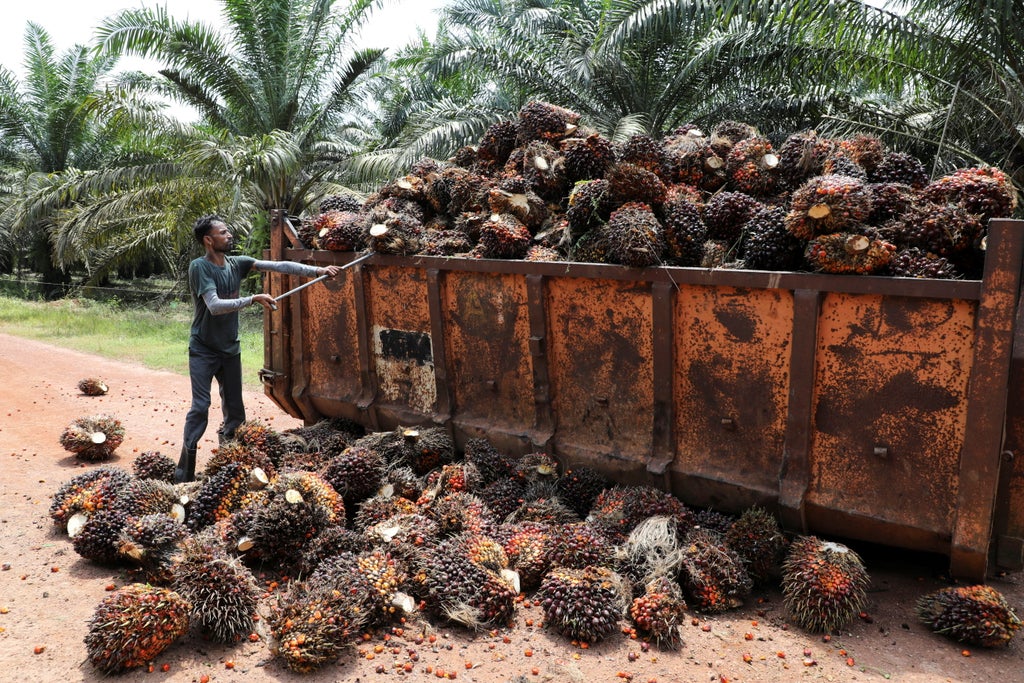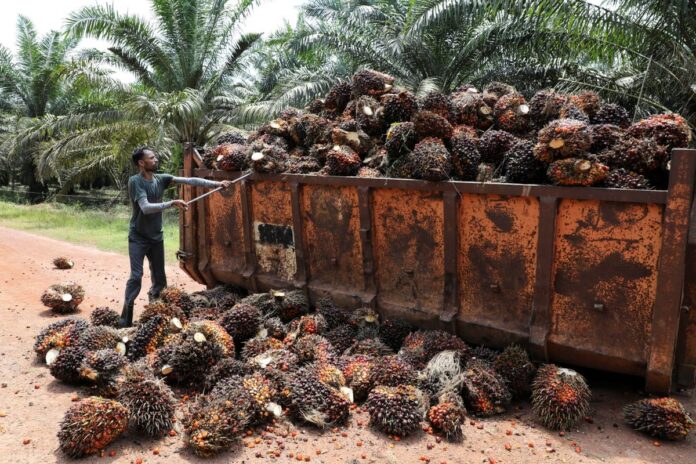[ad_1]

Some of the world’s most influential brands are still failing to tackle deforestation and damage to critical natural habitats caused by unsustainable palm oil production, campaigners have warned.
WWF’s 2021 Palm Oil Buyers Scorecard, published on Thursday, found companies including Heinz and Campbell Soups were “lagging behind” when it came to sustainable palm oil.
Chocolate maker Ferrero and Swedish furniture giant Ikea were among the companies leading the way on sustainability, the WWF report said.
In the UK, John Lewis scored highest, while Co-operative Group UK, Unilever, Tesco and Saputo Dairy UK were all described as “well on the path”.
The John Lewis Partnership/Waitrose, alongside global brands Arla Foods, and the Estée Lauder Companies have jumped from the middle to the top category in just a year, with John Lewis achieving fourth place globally.
At the other end of the scale, dozens of companies either failed to provide any information on their palm oil usage and sustainability efforts, or rated poorly.
In the UK, they included Associated British Foods, which produce many well known food brands including Jordans and Dorset cereals, Ryvita crispbread and Kingsmill bread.
Globally a third of companies failed to respond.
Katie White, executive director of advocacy and campaigns at WWF, said: “A few companies have made impressive strides to eliminate unsustainable palm oil from their businesses to protect nature. They have shown their competitors that it can be done.
“However, despite many global brands making long-standing commitments to eliminate the destruction of nature from their palm oil supply chains by 2020, the vast majority are still not acting on their promises. We won’t forget the companies that don’t step up – with so much at stake, there is no room for inaction or half measures.”
Palm oil has a wide range of uses, but is a key driver of forest loss and habitat destruction in some areas of the world, as well as harming local people through land grabs, forcing them from their homes and violating human rights.
With palm oil already the world’s most widely used and traded vegetable oil, estimates suggest demand could soar further, WWF said, potentially worsening the environmental and social harms associated with its production.
WWF’s scorecard examined 227 retailers, consumer goods manufacturers and hospitality companies around the world on their commitments and actions to create a sustainable palm oil industry. To compile the scorecard, the companies were asked to complete a questionnaire.
UK companies scored an average of 14.4 out of 24 points (0 being the worst score and 24 being the best), slightly higher than the international average of 13.2 points and on par with the European average of 14.1.
WWF said most of the companies assessed had failed to establish robust policies to ensure that the palm oil they source is not linked to deforestation and human rights abuse.
The conservation organisation is calling on companies to demonstrate that their own palm oil supply chains are sustainable and for policymakers to adopt and enforce binding legislation.
The WWF report added: “Our planet can no longer wait for palm oil buyers to turn promises into action. From deforestation to biodiversity loss to global warming, unsustainable practices by the palm oil industry have contributed to the climate and nature crises we currently face.
“Tackling them calls for accelerated and concerted corporate action, with practices and systems in place to ensure effective implementation and greater stewardship in driving change across the industry.
“Governments in producer and consumer countries alike, alongside the finance sector, also have a key role to play in promoting palm oil supply chains that protect forests, natural ecosystems and local communities.”
A spokesperson for Associated British Foods said: “100 per cent of our palm-related ingredients are sourced through supply models recognised by the Roundtable on Sustainable Palm Oil (RSPO) and our UK grocery businesses, including Kingsmill and Askeys, use only 100 per cent certified segregated sustainable palm oil, or have removed it as an ingredient from their recipes altogether.
“We’re committed to using sustainably sourced palm oil wherever possible, despite our overall volumes being relatively low compared to other global food and beverage businesses.
“We recognise there is always more to be done and are committed to increasing the percentage of palm oil we purchase that is physically certified as sustainable across all of our businesses.”
The Independent contacted Heinz and Campbell Soups for comment.
[ad_2]
Source link















